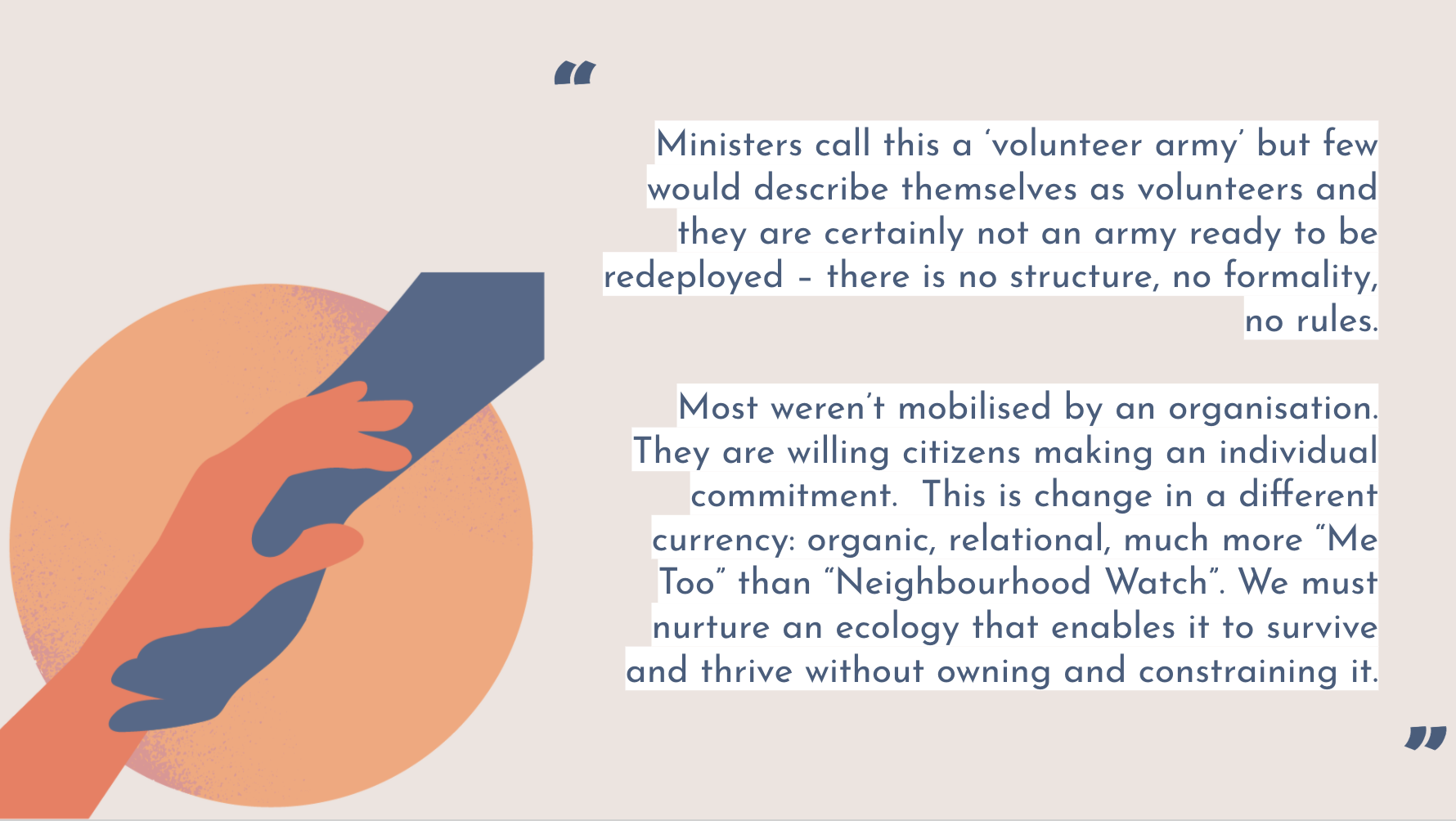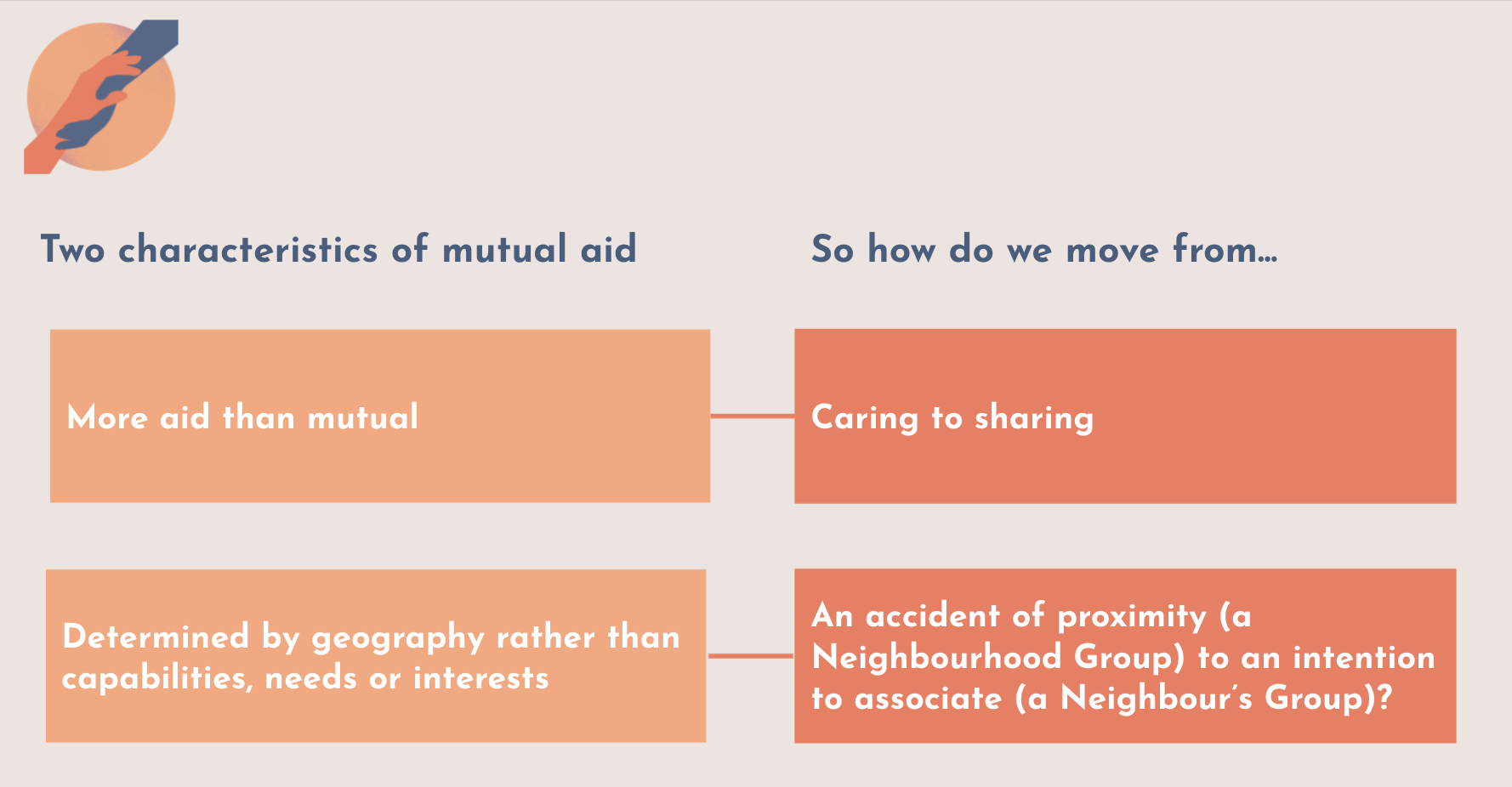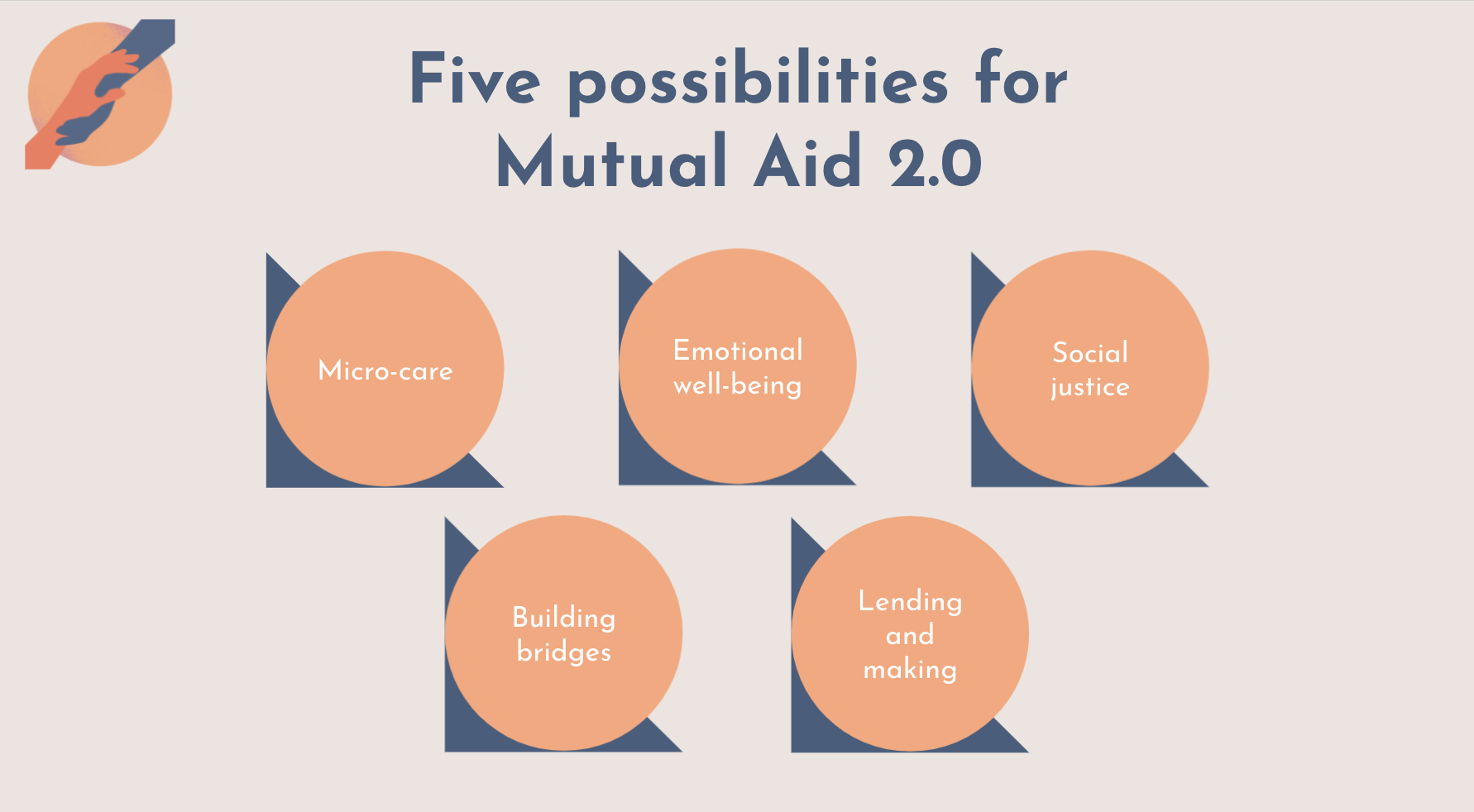
In brief
In this blog, David explores the possibilities for Mutual Aid 2.0 and shares our plans for a peer sharing group for anyone interested in the question of how we nurture and sustain community activity into the future.

A year ago, You Gov research, undertaken on behalf of the Relationships Project, showed that almost 9 million people were caring for others for more than three hours a week, that 6.29 million intended to do the same or more afterwards and that 3.94 million had done little or no volunteering before hand.
The figures have dropped off since then but probably by no more than the 30% predicated last year.
The solid 6.29 million represent an extraordinary resource for building collaborative communities that can tackle the challenges ahead and offer a better life for everyone.
Ministers have called these people a “volunteer army”. This is seriously misleading: Few describe themselves as volunteers and they are certainly not a disciplined army ready to be redeployed – there is no national structure, little formality and few rules. They are willing citizens making an individual, moral choice. Trying to catch and preserve the spirit with systems and structures is like trying to catch a butterfly in a jam jar- there is a likelihood that we will kill or damage that which makes it beautiful.
Equally, however, the potential is too great for there to be no attempt at understanding, really understanding, the movement and developing the kind of support that might enable it to evolve and flourish beyond the pandemic.
Earlier this year, the Relationships Project published a Field Guide identifying the emergent personas within the Mutual Aid movement and designed to help those who work with these Active Neighbours formally or informally, to understand them better, their motives and their interests, and to support them appropriately and effectively as their roles evolve. Together we are now co producing, an Active Neighbours Peer Support programme, training activities and a Kit Bag of practical resources.
Learning from Mutual aid
Two important learnings underpin our work:
First Mutual Aid was, predominantly, more aid than mutual. Some people shopped or cared for other people with little obvious reciprocity. How might we move from caring to sharing?
Second most activity, and most relationships, were determined by geography rather than by capabilities, needs or interests. Accessibility is obviously important, and was vital in lockdown, but is not the only criteria in realising potential when movement is unrestricted. How might we broaden the reach from an accident of proximity to an intention to associate? From a Neighbourhood Group to a Neighbours Group?

Mutual Aid 2.0
There will be as many different versions of mutual aid 2.0 as there are groups. The local ownership and the individual character and personality of the group is the essence of its strength. Examples include:
Social justice:
“Until I shopped for her, I had no idea that people in my street lived on £10 a week” said one of our participants. Some groups are starting to develop this awareness into conversation and activity around social justice with the creation of shared funds or food schemes.
Emotional well being:
The later lockdowns, particularly last winter, didn’t only affect the physically vulnerable. Many more have struggled with their mental health. Some groups are thinking about how they might become more genuinely mutual and together address emotional well being.
Bridge building:
Whilst hyper local connections were made last year, wider, cross-community relationships suffered from social distancing. We have worked with conflict transformation expert, Neil Denton, to produce the Bridge Builders Handbook and are now helping local connectors to connect with other communities and “think like mediators.”
And Micro Care:
Micro Care maybe the most natural evolution of the mutual aid model. Many people who have been helped through the crisis were isolated before hand and will be afterwards – they were just noticed more.
The mutual aid model – networked neighbours working with professional partners, linked on a simple platform and supporting the most isolated – has proved too useful to leave behind.
WhatsApp and other simple technologies were harnessed to organize and collaborate, street by street. Many of the best local authorities collaborated very effectively with these community support networks. A similarly simple, digital platform could be used to organize volunteers and statutory services around those who need support beyond the lockdown. Volunteers in the circle could be responsible for daily checks, practical needs like shopping, accompanying on visits to the doctor etc and be first responders in an emergency.
Social service professionals could be organized on a similar neighbourhood scale, small teams locally rooted, a little bit like the successful Buurtzorg model in the Netherlands. They would provide specialist services, support and oversight. In time Micro Care circles might also meet other needs. Families in need of extra assistance for instance, even short term respite support.
It is a model that would depend on good training and support and then trust and empathy much more than standardization and compliance. Again, the experience of the lockdown is encouraging:
Simple, practical tasks or transactions were seen to develop into multi faceted and sometime reciprocal relationships. Community became a resource, rather than something that needs to be fixed, and trust in others, the new currency of compliance – whilst it might be difficult for me alone to rely on a stranger without the comfort of bureaucratic protocols, I am adequately reassured by the confidence of my neighbours.
In other fields, micro credit for instance, we have seen how trust breeds trust and when we trust, we’re more likely to comply. This is the Tripadvisor or Airbnb sensibility reshaping community care.
Evolving the crisis based Mutual Aid group into a sustainable micro care model would require care, flexibility and creativity on all sides. Done well, it would improve lives and, though this is not the primary objective, save money.

Sustaining the best
These are not the only models. Mutual Aid 2.0 will look different everywhere but sustaining the best of it, and nurturing its evolution, would realise a positive legacy, nationwide, from two grievous years. As old activities and patterns of behaviour re-emerge the time for locking in the positives from the pandemic is relatively short and the clock is ticking now.
Do please contact us now if you would like to know more about our work with Active Neighbours, or to sign up for the Peer Support programme which will be kicking off in January 2021.
